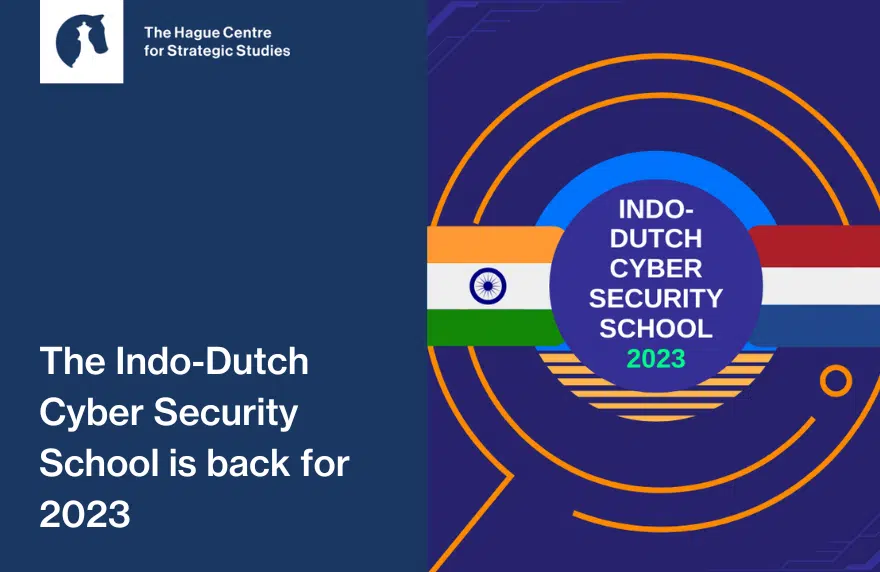For their Indo-Dutch Innovator series, the Netherlands Innovation Network India spoke to Michel Rademaker, Deputy Director at HCSS – The Hague Centre for Strategic Studies, one of the key persons behind the Indo-Dutch Cyber Security School 2022 (#IDCSS22).
Michel talked about cybersecurity, cyber diplomacy and the benefits of an Indo-Dutch collaboration in the cyber sector. Read the interview here:
Q: Could you tell us about the Indo-Dutch cybersecurity school and its highlights?
Cybersecurity is increasingly important for our digital, but also our physical world. It is integrated in all parts of life. Therefore we need to have a broad understanding of cyber, and not only the technical aspects. The Indo-Dutch cybersecurity school does this. It’s a very nice endeavor where we try to have students from an alpha, beta, and gamma background. The course does not only focus on technology, but also on cyber policy, legal aspects, social aspects, etc. That’s an important part of the thinking: we need to work interdisciplinary.
This year we have 3000 students, which we are very proud of. We hosted 21 lectures from the world’s leading experts in Cybersecurity, such as the former US Cyber Diplomat, Christopher Painter, CSIS Fellow Dr. Alexander Klimburg, GDPR and Cyber Law expert Benedetta Podesta and Dr Akash Thakar, Forensics expert.
Q: Why is it so important to work on cyber security at the moment and what is the role of international cyber diplomacy in this?
The geopolitics of cyber is getting more harsh. We face autocracies, who organize their own digital world and set up their own internets. They thereby are closing off their people from the rest of the world.
We see malicious behavior that we know from offline – such as espionage, extortions, national attacks – in the virtual domain and it is becoming more and more sophisticated. Therefore it is necessary to focus more on the cyber domain and its safety and security.
On the international approaches, multilateralism is the solution. While preparing cyber security strategies diplomacy should engage all, not only government. If you forget certain angles, you will surely only come up with a partial solution.
Q: What is the strength of India and NL working together in Cybersecurity?
In the Netherlands we invest substantially on an individual level and are strong at these type of solutions. India is all about scalability and affordability. I think India is strong on engineering and technology, and the Netherlands is looking also very much from a policy and ethical angle at cyber.
A practical example is the online school. We were overwhelmed with 3000 students and saw this as a major challenge. “How can we manage this? How do we judge all talent?” Then I spoke to Indian colleagues, and they came to a creative solution: we had everyone make a 3 minute video, put it on youtube, and had the world judge all the teams and their videos with likes and comments. An original way and one that deals with scale.
Q: What are the opportunities for India in cybersecurity in the Netherlands?
The Netherlands is emerging as a hub for India in Europe. There are over 200 Indian companies present in the Netherlands, including all the major IT companies such as TCS, HCL, Wipro, Infosys, Tech Mahindra as well as Sun Pharmaceuticals and Tata Steel. Also, there are over 200 Dutch companies present in India, including major Dutch companies like Unilever, Philips, Akzo Nobel, DSM, KLM and Rabobank. These companies all need OT- and IT-security that is comprehensive and inclusive, multistakeholder, multidisciplinary and internationally scoped.
India has great engineering education institutes and most of these students are very smart. The cybersecurity courses offered in the Netherlands are multidisciplenary and interconnected, which gives students from different verticles options to learn more and start understaning other aspects they might not be familiar with.
Q: What is your hope for the future in cyber collaborations between NL and India?
I hope that our current school can be extended. Then, next year we hope to have not more students, but have even more disciplines on board.
India is a proud country that wants to be independent mayor power. At the same time interdisciplinary, international collaboration also requires in-depth understanding of each others strengths and weaknesses. It requires willingness to reach out both ways culturally, socially, educationally, technically, for this geopolitically long term ambition need to created in a balanced manner.
Q: Do you have particular advice for students and young professionals in Cybersecurity?
As a student you want to be really good at what you do. Cybersecurity students should take up their work with a broad mindset and have a keen desire to learn from other disciplines as well. Because the better they are in multistakeholder engagement, multidisciplinary understanding of the challenges ahead as well as the, most of the time international or extraterritorial, effect their solution bring the more successful they will be!





